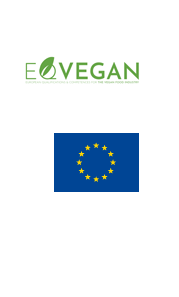Eqvegan
European Qualifications & Competences
for the Vegan Food Industry
CONTACT
Christophe Cotillon & Gemma Cornuau (Actia)
Tel. : 33 (0)6 14 08 91 41 33 (0)6 18 69 52 13
COORDINATION
Polytechnic Institute of Coimbra (Portugal)
Partners
4 full partners representing 11 different Countries:
Austria (Iseki-Food Association), Croatia (University of Zagreb), Estonia (EQA), Finland (Seamk), France (Actia), Greece (SEVT), Malte (MCAST), Poland (Puls), Portugal (Ada, IPC), Spain (Actae), Turkey (Tagem, TGDF, University of Ankara)
BEGINNING OF PROJECT
December 2020
DURATION
36 months
Reference
Objectives
The food industry is changing due to several driving forces, based on the consumer changes toward plant-based diets, leading to an increased share of production by the vegan food industry, that to maintain competitiveness needs to master new processes and technologies. Additionally, the food industry is subject to more demanding sustainability requirements, that together with digitalization and automatization trends, are quickly changing the required skills of its workers. Innovative trainings covering these technical issues are needed to support the quick change towards the vegan food industry adapted to Industry 4.0.
The aim of EQVEGAN is to support the fast-changing sub-sector of the food industry, the processing of plant-based products (vegetables, fruits, cereals and nuts), by responding to the urgent needs of training staff to support this change, by upscaling staff competences and facilitating the conversion of staff into this sector through the correction of skills gaps.
To achieve this aim, EQVEGAN established the following objectives:
1. Supply innovative and scientifically updated training
Innovative trainings to be developed in the project will be based on innovative teaching methods, using e-learning, will be scientifically updated with new technologic innovations of meat and dairy substitutes prepared from vegetables, fruits, cereals and nuts. It will also include soft skills demanded by the industry, green skills for the upgrade of sustainable development practices, and digital and automation skills to furnish the professional with key skills to constantly adapt to a fast-changing world and, in particular, the industry environment.
2. Qualify trainings with quality assurance imbedded principles
Transnational designed training with the application of European tools such as ECVET, EQAVET and EFQEA, will assure the development of high-quality trainings, in-class, e-learning and on the job, with assessment that enables the validation of trainings in a wide range of countries and that facilitates recognition and mobility. Feeding the tools available in CEDEFOP will have a multiplier effect of the project results.
3. Create a European certification scheme for trainings and job profiles
Professionals and graduates with profiles drawn on ESCO will benefit from clear certification schemes that will facilitate their mobility in EU, a rich in variety but complex industry and legal environments. The scheme will be built on an existing scheme that includes job profiles for food technologists/engineers and on the certification of courses for food science and technology existing in EU.
4. Establish a Sector Skills Alliance on training for the vegan food industry
An international Sector Skills Alliance will be implemented during the project and will continue afterwards to review and upgrade training for the vegan food industry within regular time intervals, to support the fast-changing industry that needs to keep responding to the ever-increasing demand for sustainability placed by policy makers sustainability moved by the demands of the world population.
Actions




